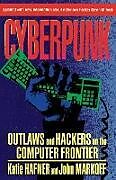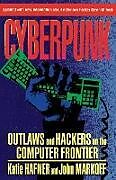Cyberpunk
Einband:
Kartonierter Einband
EAN:
9780684818627
Untertitel:
Outlaws and Hackers on the Computer Frontier, Revised
Autor:
Katie Hafner, John Markoff
Herausgeber:
Touchstone
Anzahl Seiten:
400
Erscheinungsdatum:
01.11.1995
ISBN:
0684818620
Profiles computer hackers who overstep ethical boundaries and break the law to penetrate society's most sensitive computer networks.
PC Magazine Riveting...an important chronicle of what is happening on the edge of the information age.
Autorentext
Katie Hafner is a contributing editor at Newsweek, where she covers technology. She has also written for Business Week, The New Republic, The New York Times, and Wired. She is currently working on a history of the Internet.
Klappentext
Using the exploits of three international hackers, Cyberpunk explores the world of high-tech computer rebels and the subculture they've created. In a book as exciting as any Ludlum novel, the authors show how these young outlaws have learned to penetrate the most sensitive computer networks and how difficult it is to stop them.
Zusammenfassung
Using the exploits of three international hackers, Cyberpunk provides a fascinating tour of a bizarre subculture populated by outlaws who penetrate even the most sensitive computer networks and wreak havoc on the information they find -- everything from bank accounts to military secrets. In a book filled with as much adventure as any Ludlum novel, the authors show what motivates these young hackers to access systems, how they learn to break in, and how little can be done to stop them.
Leseprobe
PART ONE
Kevin: The Dark-Side Hacker
The Roscoe Gang
It was partnership, if not exactly friendship, that kept the group together. Each member possessed a special strength considered essential for what needed to be done. Roscoe was the best computer programmer and a natural leader. Susan Thunder prided herself on her knowledge of military computers and a remarkable ability to manipulate people, especially men. Steven Rhoades was especially good with telephone equipment. And aside from his sheer persistence, Kevin Mitnick had an extraordinary talent for talking his way into anything. For a while, during its early days in 1980, the group was untouchable.
Susan was infatuated with Roscoe, but she never cared much for his constant companion, Kevin Mitnick. For his part, Kevin barely gave Susan the time of day. They learned to tolerate one another because of Roscoe. But for all their mutual hostility, Susan and Kevin shared a fascination with telephones and the telephone network; it was a fascination that came to dominate their lives. Susan, Kevin, Roscoe and Steven were "phone phreaks." By their own definition, phreaks were telephone hobbyists more expert at understanding the workings of the Bell System than most Bell employees.
The illegality of exploring the nooks and crannies of the phone system added a sense of adventure to phreaking. But the mechanical components of telephone networks were rapidly being replaced by computers that switched calls electronically, opening a new and far more captivating world for the telephone underground. By 1980, the members of this high-tech Los Angeles gang weren't just phone phreaks who talked to each other on party lines and made free telephone calls. Kevin and Roscoe, in particular, were taking phone phreaking into the growing realm of computers. By the time they had learned how to manipulate the very computers that controlled the phone system, they were calling themselves computer hackers.
Kevin was the only one of the original group to go even deeper, to take an adolescent diversion to the point of obsession. Susan, Roscoe and Steve liked the control and the thrill, and they enjoyed seeing their pranks replayed for them in the newspapers. But almost a decade later it would be Kevin, the one who hid from publicity, who would come to personify the public's nightmare vision of the malevolent computer hacker.
Born in Altona, Illinois, in 1959, Susan was still an infant when her parents, struggling with an unhappy marriage, moved to Tujunga, California, northeast of the San Fernando Valley. Even after the move to paradise, with the implicit promise of a chance to start afresh, Susan's family continued to unravel. Susan was a gawky, buck-toothed little girl. Rejected and abused, at age eight she found solace in the telephone, a place where perfect strangers seemed happy to offer a kind word or two. She made friends with operators, and began calling random numbers in the telephone book, striking up a conversation with whomever she happened to catch. Sometimes she called radio disc jockeys.
After her parents divorced, Susan dropped out of the eighth grade, ran away to the streets of Hollywood and adopted the name Susy Thunder. Susan didn't make many friends, but she did know how to feed herself. Before long, she was walking Sunset Boulevard, looking for men in cars who would pay her for sex. She cut a conspicuous figure next to some of the more diminutive women on the street. Barely out of puberty, Susan was already approaching six feet.
When she wasn't walking the streets, she was living in a hazy, drug-filtered world as a hanger-on in the L.A. music scene, a rock-star groupie. Susan was a bruised child developing into a bruised adult. Quaalude was her medium of choice for spiriting her away from reality, and when Quaalude was scarce, she switched to alcohol and heroin. Her mother finally put her into a nine-month rehabilitation program; she was abruptly thrown out midcourse. Conflicting stories of Susan's ouster were in keeping with the blurry line between fact and myth that described her life. As Susan was to tell it, the adulation of power she developed as a groupie compelled her to single out the most powerful male staff member at the treatment center and seduce him. Another story, circulated by Susan's detractors, is that the male staff member for whom she left the program "sold" her services to a brothel.
Susan found an apartment in Van Nuys and retreated once again to the telephone, taking comfort in knowing that with the telephone she could gain access to a world of her own conjuring and shut it out whenever she chose. She began calling the telephone conference lines that were springing up all over Los Angeles in the late 1970s. By dialing a conference-line number, Susan could connect herself to what sounded like cross talk, except that she was heard by the others and could join in the conversation. Some conference-line callers were teenagers who dialed up after school; others were housewives who stayed on all day, tuning in and out between household chores but never actually hanging up the phone. By nightfall, many of the conference lines turned into telephonic sex parlors, the talk switching from undirected chitchat to explicit propositions.
One day in early 1980 Susan discovered HOBO-UFO, one of the first "legitimate" conference lines in Los Angeles in that its owners used their own conferencing equipment instead of piggybacking on the phone company's facilities. Drawing hundreds of people every day, HOBO-UFO was run from the Hollywood apartment of a young college student who called himself Roscoe. A friend of Roscoe's named Barney financed the setup, putting up the money for the multiple phone lines and other equipment while Roscoe provided the technical wherewithal. Susan decided she couldn't rest until she had met Roscoe, the power behind it all. But to achieve that goal, Susan knew she would have to abandon her disembodied telephone persona. She liked describing herself to men over the telephone. She knew from experience that all she had to do was mention that she was a six-foot-two blond and she wouldn't have to wait long for a knock at the door. She was right. No sooner did she deliver the description than Roscoe came calling.
The woman who greeted Roscoe was exactly as she had described herself. Susan had dressed up and made her face up carefully for the big date…

Leider konnten wir für diesen Artikel keine Preise ermitteln ...
billigbuch.ch sucht jetzt für Sie die besten Angebote ...
Die aktuellen Verkaufspreise von 6 Onlineshops werden in Realtime abgefragt.
Sie können das gewünschte Produkt anschliessend direkt beim Anbieter Ihrer Wahl bestellen.
Loading...
Die aktuellen Verkaufspreise von 6 Onlineshops werden in Realtime abgefragt.
Sie können das gewünschte Produkt anschliessend direkt beim Anbieter Ihrer Wahl bestellen.
| # | Onlineshop | Preis CHF | Versand CHF | Total CHF | ||
|---|---|---|---|---|---|---|
| 1 | Seller | 0.00 | 0.00 | 0.00 |
